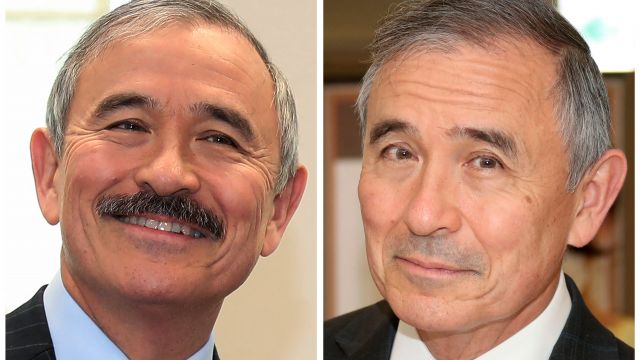Harry Harris’s facial hair had drawn criticism from the media and a small number of online commentators, who compared his moustache to those worn by colonial Japanese governors during the country’s brutal rule of the Korean Peninsula from 1910 to 1945.
Mr Harris, a retired navy admiral who became ambassador in July 2018, acknowledged in January that his moustache had become “a point of some fascination here”.
He also said he was being criticised for his ethnic background as a Japanese-American.
잘한 결정이라고 생각합니다. 콧수염을 기르고 마스크까지 착용하기엔 서울의 여름은 매우 덥고 습합니다. 코로나 지침이 중요하니 마스크는 필수죠! 오 사장님을 뵙게 되어 반가웠고 #한미동맹 을 중요하게 생각해주셔서 매우 감사했습니다. https://t.co/pqfIQshM2g
— Chargé d’Affaires Chris Del Corso (@USAmbROK) July 25, 2020
Advertisement
“Glad I did this,” Mr Harris tweeted after his visit to a barbershop in Seoul, South Korea’s capital.
“For me it was either keep the ‘stache or lose the mask. Summer in Seoul is way too hot & humid for both. #COVID guidelines matter & I’m a masked man!”
His embassy tweeted a video that showed Mr Harris bumping elbows with a masked barber and gesturing for a shave.
He playfully rolled his eyes as he lay back on a leather chair as the barber shaved his moustache and trimmed his eyebrows.
“Wow, I haven’t seen this face in years!” Mr Harris exclaimed after washing his face and applying lotion.
In an interview last year with The Korea Times, an English-language daily, Mr Harris said he would keep his moustache unless someone convinces him that it is “viewed in a way that hurts” the relationship between Washington and Seoul.
The newspaper said Mr Harris’s moustache “has become associated with the latest US image of being disrespectful and even coercive towards Korea”.
Relations between South Korea and Japan sank to their lowest point in decades last year as they feuded over trade issues, wartime history and military co-operation.
South Korea’s own alliance with the United States has also become shaky under the administration of President Donald Trump, who has openly complained about the costs of maintaining the 28,500 US troops stationed in South Korea to protect against North Korean threats.
The allies have failed to sign a new cost-sharing agreement after the last one expired at the end of 2019.







